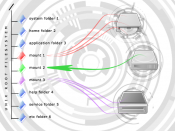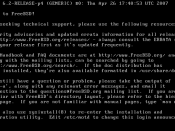Reliability
FreeBSD
FreeBSD is extremely robust. There are numerous testimonials of active servers with uptimes measured in years. The new Soft Updates file system optimizes disk I/O for high performance, yet still ensures reliability for transaction based applications, such as databases.
Linux
Linux is well known for its reliability. Servers often stay up for years. However, disk I/O is non-synchronous by default, which is less reliable for transaction based operations, and can produce a corrupted filesystem after a system crash or power failure. But for the average user, Linux is a very dependable OS.
Performance
FreeBSD
FreeBSD is the system of choice for high performance network applications. FreeBSD will outperform other systems when running on equivalent hardware. The largest and busiest public server on the Internet, at ftp.freesoftware.com, uses FreeBSD to serve more than 1.2TB/day of downloads. FreeBSD is used by Yahoo!, Qwest and many others as their main server OS because of its ability to handle heavy network traffic with high performance and rock solid reliability.
Linux
Linux performs well for most applications, however the performance is not optimal under heavy network load. The network performance of Linux is 20-30% below the capacity of FreeBSD running on the same hardware . The situation has improved somewhat recently and the 2.4 release of the Linux kernel will introduce a new virutual memory system based on the same concepts as the FreeBSD VM system. Since both operating systems are open source, beneficial technologies are shared and for this reason the performance of Linux and FreeBSD is rapidly converging.
Security
FreeBSD
FreeBSD has been the subject of a massive auditing project for several years. All of the critical system components have been checked and rechecked for security-related errors. The entire system is open source so the security of the system can and...


